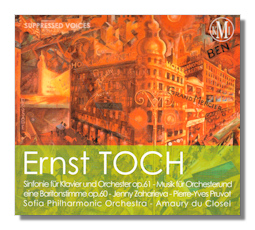
The Internet's Premier Classical Music Source
Related Links
- Toch Reviews
- Latest Reviews
- More Reviews
-
By Composer
-
Collections
DVD & Blu-ray
Books
Concert Reviews
Articles/Interviews
Software
Audio
Search Amazon
Recommended Links
Site News
 CD Review
CD Review
Ernst Toch

Orchestral Works
- Symphony for Piano & Orchestra, Op. 61 1
- Music for Orchestra and a Baritone Voice, Op. 60 2
1 Jenny Zaharieva, piano
2 Pierre-Yves Pruvot, baritone
Sofia Philharmonic Orchestra/Amaury du Closel
Karusel Music KDFC120110
Ernst Toch, who lived from 1887 to 1964, is a somewhat anomalous composer. His work is not particularly innovative, although he lived in an environment in which and through decades during which music changed a great deal. His biography goes some way to explaining this. Counted by some a child prodigy, he was basically originally self-taught; but had to leave the Vienna Academy in 1902 for lack of funds. He then fled Germany in 1933 at the onset of the fascist regime. A relatively prolific composer, Toch's work was taken up in the 1920s and 1930s by prominent and eminent performers and conductors like Gieseking, Kleiber and Klemperer. He associated with the recognized "greats"… Milhaud, Weill and Hindemith. Yet by the end of his life Toch could quite reasonably complain that he was the world's "most forgotten composer". Given the extent of his output, the fewer than 20 CDs in the current catalog devoted exclusively to Toch's work suggest the time has come for some reappraisal.
The playing on this CD goes a long way towards contributing to such a project. It contains two works: the "Symphony" for piano and orchestra (Opus 61) in four movement in which Jenny Zaharieva joins the Sofia Philharmonic Orchestra in just over half an hour of scintillating and insightful, varied and expressive playing.
And the "Music for Orchestra and Baritone Voice" with Pierre-Yves Pruvot. Each work (both written in 1932) is ably conducted by Amaury du Closel. In each it is indeed the orchestra that receives the lion's share of the musical invention and drive. Echoes of Toch's fellow pupil in Frankfurt, Hindemith, are strong – the broad theme at the close of the piano piece [tr.4] is typical. The same can be said of the end of the allegro incalzato ("pushed") end of the "Music for Orchestra and Baritone Voice" [tr.8], although it's here that the tendency of the Sofia Philharmonic to lose a little of the sprightliness needed for broad orchestral tutti is discernible.
Toch's writing has the sensitivity and depth to grow on the listener too. Like the music of other of his contemporaries in the conservative Austrian tradition, he has little to prove. The music is both taut and delicate without being unduly pointed or precious. The pace and sense of the music's structure which du Closel draws from the Sofia Philharmonic make what Toch wrote sound inevitable in ways in which the Neoclassical timbres and textures of Stravinsky and Prokofiev do not. In fact, Toch might be described as a Germanic simulacrum, or more kindly, brother of the latter.
There is contrast in the dynamics of these works, too. The first movement of the "Music for Orchestra and Baritone Voice", for instance, is as pensive as it is confident. To ensure clarity and communicativeness, each soloist in their different way projects not their own instrument or voice; but Toch's somewhat dour and always reflective tone. Pruvot's articulation is superb as he weaves his way through the devotion and dedicated sincerity of Rilke's text.
The recording is close and focused, though Karusel haven't "embossed" the music in any way. The short booklet is illuminating; it also contains the text in German and English. If Toch is new to you or little more than a name, this will serve as a convincing and faithful introduction. There is one other recording of the "Sinfonie"; but none of the "Musik für Orchester und eine Baritonstimme". There is more to listening to Toch than wondering which direction music might have taken, had not Schoenberg intervened. For the most part it's compelling music in its own right. And here played – again for the most part – very well.
Copyright © 2013, Mark Sealey



















